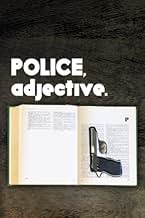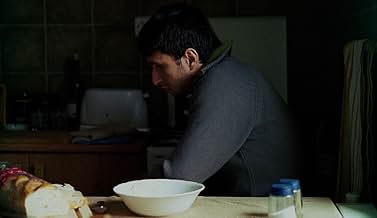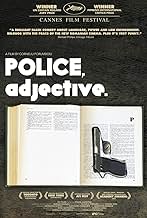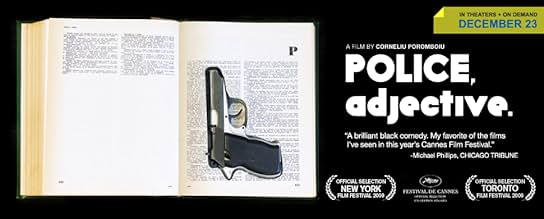NOTE IMDb
6,9/10
5,4 k
MA NOTE
Ajouter une intrigue dans votre langueA police officer refuses to arrest a young man for offering drugs to his friends.A police officer refuses to arrest a young man for offering drugs to his friends.A police officer refuses to arrest a young man for offering drugs to his friends.
- Réalisation
- Scénario
- Casting principal
- Récompenses
- 15 victoires et 15 nominations au total
George Remes
- Vali
- (as Remes George)
Constantin Dita
- Officer on Duty
- (as Costi Dita)
Avis à la une
Like Bruno Dumont's epic police procedural L'Humanité, Police, Adjective is a film of mood, silence, and soul. Winner of the Un Certain Regard Jury Prize at the 2009 Cannes Film Festival, the second feature by Romanian director Corneliu Porumboiu is a follow-up to his black comedy 12:08 East of Bucharest which won the Camera D'Or at Cannes in 2006. Police, Adjective is about a taciturn, plain-clothed police officer who has developed a conscience over making an arrest, an unusual occurrence in the bureaucratic, post-Communist society of Romania where the law is rigidly enforced regardless of its logic. Like Phaaron of L'Humanité, Cristi (Dragos Bucur) is an unlikely cop, an unglamorous member of the working class who wears the same pullover sweater four days in a row and goes about his job in a mechanical and emotionally unexpressive manner.
Shown at the Vancouver Film Festival, Police, Adjective is set in the director's hometown of Vaslui in northeastern Romania, a venue that looks unbearably bleak. The general atmosphere is one of decay with paint inside the houses peeling and chipped, lockers rusted, mailboxes broken, and computers looking like Model Ts. There are no camera tricks here, only long takes delivered from a horizontal pan, cinematography that deliberately enhances the tedium. Porumboiu devotes long stretches of the film watching Cristi simply going about his routine. On orders from his superior, Nelu (Ion Stoica), he follows Alex (Alexandru Sabadac), a teenager at the local high school who is suspected of buying hash and selling it to his fellow students, shadowing the boy daily from home to school in hopes of finding out the source of the drugs.
In the course of his investigation, however, Cristi realizes that Alex is just a kid who occasionally smokes pot with some of his pals and is not a threat to society. Taking detailed notes, Cristi avoids meeting with his boss, waiting to find out the source of the hash before making a move, knowing that arresting a sixteen year old boy for smoking will mean a prison term of at least three years and possibly seven. Finally, when he is ordered to make a full report and take action, Cristi refuses to follow orders from the Police Captain, citing his conscience and the fact that the law will soon be repealed. Like Phaaron of L'Humanité, Cristi is willing to remain faithful to what he believes in but his feelings are ignored by those in a position of power.
In a memorable sequence, Cristi's boss, Captain Anghelache (Vlad Ivanov) brings in a Romanian dictionary and asks him to look up the meaning of the words "conscience", "law", "moral", and "police", attempting to show him that as a police officer he must obey the letter of the law, not impose his own morality on the situation. The scene is cold, efficient, and persuasive but it is obvious that the law he is asked to follow is based more on semantics than on morality. While most of the first half of the film is filled with uneventful surveillance, a scene at home between Cristi and his wife Anca (Irina Saulescu) adds some humor to the dour proceedings. Husband and wife discuss the meaning of the lyrics of a popular song that Anca is playing over and over again, Cristi giving the words a literal meaning which make little sense, while his wife ascribes to them their proper symbolic and poetic meaning.
Police, Adjective provides a welcome dose of conscience to a genre that has been buried in technology and filled with violence, car chases, and ugliness, a genre that has dealt only with methods and not consequences. While the film is austere and requires a great deal of patience, with little dialogue and no musical score, Porumboiu forces us to relate to the characters by observing their eyes, their physical movements, and their facial expressions. He expects us not only to see but to think about what we are seeing and, in the process, to bring us face to face with what makes us truly human.
Shown at the Vancouver Film Festival, Police, Adjective is set in the director's hometown of Vaslui in northeastern Romania, a venue that looks unbearably bleak. The general atmosphere is one of decay with paint inside the houses peeling and chipped, lockers rusted, mailboxes broken, and computers looking like Model Ts. There are no camera tricks here, only long takes delivered from a horizontal pan, cinematography that deliberately enhances the tedium. Porumboiu devotes long stretches of the film watching Cristi simply going about his routine. On orders from his superior, Nelu (Ion Stoica), he follows Alex (Alexandru Sabadac), a teenager at the local high school who is suspected of buying hash and selling it to his fellow students, shadowing the boy daily from home to school in hopes of finding out the source of the drugs.
In the course of his investigation, however, Cristi realizes that Alex is just a kid who occasionally smokes pot with some of his pals and is not a threat to society. Taking detailed notes, Cristi avoids meeting with his boss, waiting to find out the source of the hash before making a move, knowing that arresting a sixteen year old boy for smoking will mean a prison term of at least three years and possibly seven. Finally, when he is ordered to make a full report and take action, Cristi refuses to follow orders from the Police Captain, citing his conscience and the fact that the law will soon be repealed. Like Phaaron of L'Humanité, Cristi is willing to remain faithful to what he believes in but his feelings are ignored by those in a position of power.
In a memorable sequence, Cristi's boss, Captain Anghelache (Vlad Ivanov) brings in a Romanian dictionary and asks him to look up the meaning of the words "conscience", "law", "moral", and "police", attempting to show him that as a police officer he must obey the letter of the law, not impose his own morality on the situation. The scene is cold, efficient, and persuasive but it is obvious that the law he is asked to follow is based more on semantics than on morality. While most of the first half of the film is filled with uneventful surveillance, a scene at home between Cristi and his wife Anca (Irina Saulescu) adds some humor to the dour proceedings. Husband and wife discuss the meaning of the lyrics of a popular song that Anca is playing over and over again, Cristi giving the words a literal meaning which make little sense, while his wife ascribes to them their proper symbolic and poetic meaning.
Police, Adjective provides a welcome dose of conscience to a genre that has been buried in technology and filled with violence, car chases, and ugliness, a genre that has dealt only with methods and not consequences. While the film is austere and requires a great deal of patience, with little dialogue and no musical score, Porumboiu forces us to relate to the characters by observing their eyes, their physical movements, and their facial expressions. He expects us not only to see but to think about what we are seeing and, in the process, to bring us face to face with what makes us truly human.
The Romanian film wonder goes on and what's wonderous about it is that it's not afraid of life, like most movies around the world are. Since the beginning of the 1900s, there's an agreement about that life being absolutely boring. Lucky thing you can cut the film.
But here, we follow the young policeman on a routine mission, trying to investigate a supposed drug crime. The camera goes on for ten minutes, nothing happens or more likely...everything happens. What's morality about. Following the law or following your conscience? Or is it the same thing? Or should it be? An action drama there the action takes place inside the characters and the viewers. And that's absolutely fair enough.
But here, we follow the young policeman on a routine mission, trying to investigate a supposed drug crime. The camera goes on for ten minutes, nothing happens or more likely...everything happens. What's morality about. Following the law or following your conscience? Or is it the same thing? Or should it be? An action drama there the action takes place inside the characters and the viewers. And that's absolutely fair enough.
One of the best movies of the year - and, definitely, of the Romanian cinema all over.
After "12:08: East of Bucharest" (aka "A fost sau n-a fost" - original title), Cornel Porumboiu does it again: an incisive and tender, empathic and ruthless look into our contemporary humanity. It brings back memories of Kafka's "Trial": the blind mechanism of Law, meant to help us live better and, because of so many machine-like people, turned into a device for destroying lives. In the role of the young policeman who loses his faith into the system, Dragos Bucur brings on screen another of his memorable performances - subtle, deep, finely tuned.
But the main virtue of this excellent movie, of course, is Cornel's directing - credible, original, precise. The static long shots, creating pent-up inner tensions... the unbearable waiting scenes, under a leaden sky... the discrete plastic compositions of the frame... the insidious rhythm... the careful attention to the minutest details - everything, with a due meaning and a perfectly weighted impact.
Special kudos for the pivotal scene built up around Mirabela Dauer's song "I Don't Leave You Love" - a rare piece of abstruse idiocy, used as a main axis for the protagonist's confrontation with the life's absolute absurdity. The scene is so masterfully built and shot, that it makes us scream laughing (in Cannes, the audience was delirious) - but the ultimate meaning is tragic... this being Porumboiu's definitory characteristic - as he said himself: "comical authors are often the saddest ones of all".
After "12:08: East of Bucharest" (aka "A fost sau n-a fost" - original title), Cornel Porumboiu does it again: an incisive and tender, empathic and ruthless look into our contemporary humanity. It brings back memories of Kafka's "Trial": the blind mechanism of Law, meant to help us live better and, because of so many machine-like people, turned into a device for destroying lives. In the role of the young policeman who loses his faith into the system, Dragos Bucur brings on screen another of his memorable performances - subtle, deep, finely tuned.
But the main virtue of this excellent movie, of course, is Cornel's directing - credible, original, precise. The static long shots, creating pent-up inner tensions... the unbearable waiting scenes, under a leaden sky... the discrete plastic compositions of the frame... the insidious rhythm... the careful attention to the minutest details - everything, with a due meaning and a perfectly weighted impact.
Special kudos for the pivotal scene built up around Mirabela Dauer's song "I Don't Leave You Love" - a rare piece of abstruse idiocy, used as a main axis for the protagonist's confrontation with the life's absolute absurdity. The scene is so masterfully built and shot, that it makes us scream laughing (in Cannes, the audience was delirious) - but the ultimate meaning is tragic... this being Porumboiu's definitory characteristic - as he said himself: "comical authors are often the saddest ones of all".
I first watched this film about a year ago, and I struggled through it because it truly is one of the slowest and uneventful films you'll ever see, but It has grown on me a lot and isn't a film that you'll forget after seeing. The film deals with themes like guilt, responsibility, choice, patience, with some underlined political themes. Its one thing to conceptualize a film effectively but it's another to execute it correctly, and I think Corneliu Porumboiu did a very honorable job in both those departments. It's one of my favorite films, actually. there's a scene near the end of the film where the main character, one of his colleagues, and his boss are sitting in his office discussing the main character's struggle between the law and his own conscience. This scene goes on for close to 30 minutes if i remember correctly, and it's all done on one shot, with the exception of a few little overlapping shots to view the contents of a dictionary in the main character's hands. I was really impressed by that whole scene. Even if you don't love it, it's definitely worth at least one watch.
I recently saw "4 Months, 3 Weeks, 2 Days", about a woman's efforts to have an abortion in Nicolae Ceausescu's Romania. Now comes "Politist, adj." ("Police, Adjective" in English), Romania's submission to the Academy Awards as Best Foreign Language Film of 2009. This one looks at small-town cop Cristi (Dragos Bucur) assigned to investigate a boy smoking hashish, and how he begins to have misgivings about the ethical ramifications of the task.
What strikes me is how much this small town in Romania looks like Russia. Most of the buildings all have a very Eastern Bloc look. To be certain, there are a few scenes where Dragos goes to the boy's house in what appears to be a posher section of the town, with more modern-looking houses. Many of the scenes in the film are long shots, especially the scene where Cristi and his superior use the dictionary to debate the true meaning of conscience and other words.
I don't know if I would call this the greatest movie ever made, but I still recommend it. The scene where Cristi eats dinner while his wife has an obnoxious song playing on the computer really shows Cristi's break in terms of conscience, just because of how he reacts.
Anyway, I like to get to see cultures that we don't often see, and I really liked this movie. I hope that Romania gives us more like this.
What strikes me is how much this small town in Romania looks like Russia. Most of the buildings all have a very Eastern Bloc look. To be certain, there are a few scenes where Dragos goes to the boy's house in what appears to be a posher section of the town, with more modern-looking houses. Many of the scenes in the film are long shots, especially the scene where Cristi and his superior use the dictionary to debate the true meaning of conscience and other words.
I don't know if I would call this the greatest movie ever made, but I still recommend it. The scene where Cristi eats dinner while his wife has an obnoxious song playing on the computer really shows Cristi's break in terms of conscience, just because of how he reacts.
Anyway, I like to get to see cultures that we don't often see, and I really liked this movie. I hope that Romania gives us more like this.
Le saviez-vous
- AnecdotesRomania's official submission to 82nd Academy Award's Foreign Language in 2010.
- Bandes originalesNu te parasesc iubire
Performed by Mirabela Dauer
Arranged by Dan Dimitriu
Lyrics by Dan Ioan Pantoiu
Produced by Roton Music
Played and discussed at Cristi's home
Meilleurs choix
Connectez-vous pour évaluer et suivre la liste de favoris afin de recevoir des recommandations personnalisées
- How long is Police, Adjective?Alimenté par Alexa
Détails
Box-office
- Budget
- 800 000 € (estimé)
- Montant brut aux États-Unis et au Canada
- 53 206 $US
- Week-end de sortie aux États-Unis et au Canada
- 19 452 $US
- 27 déc. 2009
- Montant brut mondial
- 162 974 $US
- Durée1 heure 55 minutes
- Couleur
- Mixage
- Rapport de forme
- 1.85 : 1
Contribuer à cette page
Suggérer une modification ou ajouter du contenu manquant

Lacune principale
By what name was Policier, adjectif (2009) officially released in India in English?
Répondre














